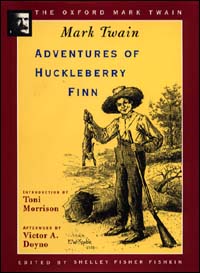
 |
This time through, what jumped out at me was the way that the entire book is a nearly endless string of cover stories — on page after page, Huck makes up another new story about who he is and what he's doing, and so do a bunch of other characters. This culminates nicely in Huck's climactic decision to continue to help Jim escape from slavery even though he knows that it's wrong and that he'll go to hell for it — he discovers that he can't make himself pray for the virtue to turn Jim in because deep down he knows he's "playing double" and that "you can't pray a lie." Throw in a bunch of quotes to pad things out and that's another paper.
As part of a broader project, you could take this angle: what does it say about America that what is widely acclaimed as the foundational text of American literature is all about lies, schemes and con men? (Good intro to a Mamet paper.) For that matter, what does it say about us that we revere not some cerebral masterwork or heartrending tragedy but a comedy about an ill-bred, ignorant child with a good heart who Got Rich Quick? (Note to past self: could've put that in your colloquium paper on Forrest Gump, dude. PS: what the hell are you doing in Illinois?) There's lots of interesting stuff to think about here...
But as I may or may not have mentioned, the original reason I decided to read all of Mark Twain's published work in order was because I plan to write a book about Joan of Arc someday, and in his later life, Twain was obsessed with her. I've long been fascinated that a cynical humorist tied in the popular imagination to boyhood in the American West should have been fixated on a late medieval teenage female French saint, of all people. And with this in mind, I was struck by the role played in Huck Finn by Mary Jane Wilks. This is a character by Mark Twain — Mark Twain, who was sufficiently concerned that his point hadn't been made in "The Bad Little Boy Who Didn't Come to Grief" that he wrote a follow-up story called "The Story of the Good Little Boy" in which the title character's piety and virtue get him repeatedly beaten down and eventually killed; Mark Twain, who even in the earlier sections of this very novel (written years before the later sections) cheerfully mocks schoolmarms and sentimental 19th-century goth girls; and then suddenly here is this young woman who is basically perfect: spirited, virtuous, kind-hearted, capable. "She was the best girl I ever see, and had the most sand," Twain has Huck write, and there's no punchline. Somewhere between starting Huck Finn and finishing it, Mark Twain has made room in his world for unironically angelic 19-year-old girls. That's not a paper. That would've been my dissertation.
